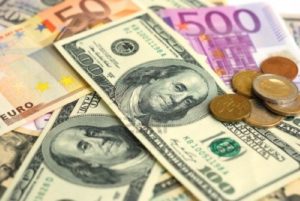 The euro advanced to the strongest level in almost three weeks against the US dollar on Friday, after better-than-expected euro zone growth rates boosted demand for the 18-nation common currency, while at the same time overall downbeat US data dampened the greenbacks appeal.
The euro advanced to the strongest level in almost three weeks against the US dollar on Friday, after better-than-expected euro zone growth rates boosted demand for the 18-nation common currency, while at the same time overall downbeat US data dampened the greenbacks appeal.
EUR/USD touched a session high at 1.3715 at 12:00 GMT, after which the pair settled at 1.3693 on Friday, adding 0.09% for the day. The pair settled the week 0.43% higher, after it added 1.08% in the previous 5-day period. Support was likely to be received at February 13th low, 1.3585, while resistance was to be met at January 27th high, 1.3717.
The euro was supported as preliminary data revealed the GDP in the largest euro zone economy, Germany, and in the 18-nation common currency area, expanded in the fourth quarter more than analysts predicted.
The German Federal Statistical Office, Destatis, reported on Friday that the nation’s preliminary gross domestic product rose by 0.4% in Q4, outstripping analysts’ estimates of a 0.3% increase. Germany, which is the largest euro zone economy, expanded 0.3% in the three months to September.
A separate report by Eurostat, revealed the preliminary gross domestic product of the 18-nation common currency area grew 0.3% in the fourth quarter, compared to the previous quarter, exceeding analysts’ forecasts for a 0.2% increase. The euro zone economy expanded by 0.1% in the three months through September.
On annual basis, the euro zone economy expanded by 0.5% in the fourth quarter, beating analysts’ projections of a 0.4% increase and after a 0.3% drop in the previous quarter.
In its monthly bulletin released on Thursday, the ECB firmly assured that interest rates will be kept at present or even lower levels for a prolonged period of time. The monthly bulletin came in consonance with the main policy statement taken by the central bank President Mario Draghi last week. Mario Draghi left policy on hold, with the benchmark interest rate unchanged at a record low 0.25%.
“The Governing Council firmly reiterates its forward guidance,” the ECB said today, cited by Thomson Reuters. “It continues to expect the key ECB interest rates to remain at present or lower levels for an extended period of time.”
The central bank policy members also said that they expect global inflation to be subdued in the next few months, but also reiterated that the inflation in the euro area is projected to gradually increase towards ECB’s target of just below 2%.
Meanwhile, a survey, conducted by Thomson Reuters and the University of Michigan, showed that US consumers retained their optimism regarding nation’s economic development in the middle of February. The preliminary reading of the corresponding index of consumer confidence came in at 81.2, which confirmed the final value reported in late January. The median estimate of experts pointed that the index will probably slow down to a reading of 80.5 this month. The data suggested that consumers might be able to increase their spending, after severe winter in January adversely influenced their expenditures.
However, demand for the US dollar was dampened after a report by the US Federal Reserve revealed that the US industrial output declined by 0.3% in January, capping the first monthly drop since April, defying analysts’ predictions for a 0.2% advance and after a 0.3% increase in the preceding month.
Data by the US Labor Department revealed today that the nation’s import prices rose 0.1% in January, confounding analysts’ projections for a 0.1% drop and after import prices increased 0.2% in December. However, on year-over-year basis, import prices slumped 1.5% in December, after a 1.3% decline in the previous month.
Greenback’s demand continued to be pressured after downbeat US reports added to signs of uneven economic recovery.
The US Department of Labor reported on Thursday that the number of people who filed for unemployment benefits for the first time unexpectedly increased to 339 000 in the week ended February 8, while analysts projected the number of initial jobless claims will decline to 330 000 from 331 000 in the previous week.
A separate report by the US Census Bureau, revealed the nation’s retail sales dropped by 0.4% in January, the most since June 2012 and after a downward revised 0.1% decrease in the previous month. Analysts had expected the retail sales index to remain flat in January. Retail sales are closely watched, because they provide crucial information regarding the tendency in consumer spending in the United States, which, on the other hand, accounts for about 70% of nation’s Gross Domestic Product.
During the week ahead investors’ attention will be focused on the minutes of Federal Reserve Bank’s most recent policy meeting and the report on US consumer price inflation for January.
EUR/USD may be influenced by a number of reports, scheduled for publication during the upcoming week as follows:
On Monday (February 17th), markets in the United States are to remain closed due to a federal holiday honoring the birthday of the first President of the country, George Washington. At the same time, no important economic indicators are scheduled to be released out of the euro area.
On Tuesday (February 18th), the United States is to announce the results in a survey, encompassing manufacturers in the area of New York. The corresponding index probably slowed down to 9.50 in February from 12.51 in the preceding month.
Meanwhile, the euro zone is expected to report on its seasonally adjusted current account, whose surplus is expected to narrow to 19.8 billion euro in December from 23.5 billion euro a month ago. Data about investors expectations and their current situation assessment is scheduled to be released for Germany and the euro zone.
On Wednesday (February 19th), the US Bureau of Labor Statistics is to report on producer prices in January, followed by data regarding housing starts and building permits also in January.
At 19:00 GMT the Federal Reserve Bank will publish the minutes of its policy meeting, conducted on January 28th-29th.
The euro zone is not expected to publish reports on important economic indicators.
On Thursday (February 20th), France, Germany and the euro zone will release preliminary PMI data in the services and manufacturing sectors. Meanwhile, the United States will release its weekly report on initial jobless claims, an indicator for lay-offs in the country, followed by data regarding the index of consumer prices in January. The annualized consumer inflation probably accelerated to 1.6% last month from 1.5% in December.
Markit Economics is expected to report on the preliminary reading of its manufacturing PMI for the United States in February.
At 15:00 GMT the Federal Reserve will announce the results in its survey, encompassing manufacturers in the region of Philadelphia.
On Friday (February 21st), the National Association of Realtor’s (NAR) will release a report on existing home sales in the United States in January, an indicator for current housing market conditions.





